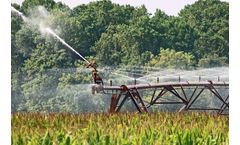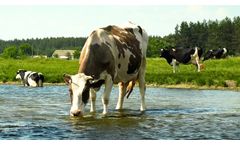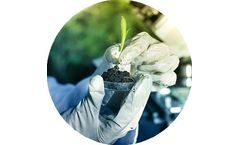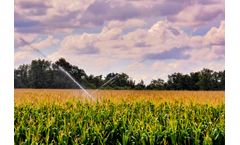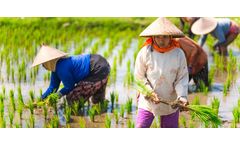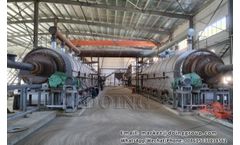Refine by
Crop Yield Articles & Analysis
558 articles found
Recent research projects run by Dr E Thompson (University of Greenwich), the photovoltaics company Polysolar, and Hugh Lowe Farms in Kent, have been exploring the potential for UK soft fruit farms to harness solar power while simultaneously producing high quality crops. By retrofitting semi-transparent photovoltaic materials to glasshouses and polytunnels, the projects have demonstrated how ...
In today’s rapidly changing world of agriculture, effective water management is the secret to having healthy crops, farming sustainably, and achieving maximum yields. With the world’s population increasing and food requirements increasing, farmers are taking up new concepts to farm with greater efficiency and preserve precious water. ...
Grain carts are an effective way to reduce equipment wear and field compaction. Why waste expensive combine hours stopping to unload onto trucks at the end of the field? Or worse, exposing your operation to yield loss by compacting the ground with trucks in the field? Both these practices waste precious harvest time and put unnecessary wear on your equipment. Grain carts stay on the field, ...
Its quality plays a pivotal role in crop health, yield, and overall farm productivity. However, one of the most persistent threats to agricultural water sources is algal blooms. ...
The study was designed to monitor sour rot and crop yields with four applications during the growing season (March to September). ...
Farmers, landscapers, and property managers often struggle to maintain adequate water pressure in irrigation systems. Without consistent pressure, water distribution becomes uneven, leading to poor crop health, inefficient resource usage, and potential damage to the irrigation infrastructure. These issues can hinder productivity and increase operational costs, making it essential to adopt ...
An irrigation system pump plays a critical role in ensuring that crops receive adequate water, enabling farmers to optimize yields and conserve resources. ...
Urbanization and Changing Diets: With urbanization, there’s an increase in the consumption of fruits and vegetables, requiring better crop yields. 4. Integration of Technology: The usage of genetically modified crops and advanced farming technologies is driving agrochemical applications. ...
This moisture-holding capacity is especially beneficial in arid or semi-arid climates, where water conservation is critical to successful crop production. 3. Sequestering Carbon and Mitigating Climate Change Biochar production is not only beneficial for soil health but also for the environment. ...
This dual role of promoting growth while also facilitating stress responses underscores the importance of plant hormones in agriculture. By influencing crop yield and resilience, research into plant hormones has become vital for improving agricultural practices and ensuring food security. ...
Main Applications of Liposomes in Agricultural Research Liposomes may serve as carriers and active agents for pesticides and fertilizers, thereby promoting their absorption in crops. The objective of Liposome Formulation Development is to bring benefits to sustainable agriculture based on liposome platform. Pesticides and insecticides Liposomes can enhance the delivery of ...
Agricultural practices in developing countries often face hurdles such as: Soil Degradation: Continuous farming and overuse of chemical fertilizers deplete soil nutrients. Low Crop Productivity: Poor soil quality and limited access to advanced technologies result in low yields. ...
In today’s highly regulated industries like food and beverage storage and agriculture, maintaining optimal humidity control is critical to ensuring product quality, extending shelf life, and maximizing operational efficiency. The Industrial Applications of Membrane Humidifier – Food and Beverage Storage, Agriculture and Vertical Farming Industry rely heavily on precise humidification ...
Therefore, contemporary field irrigation systems have developed as an all-important tool to facilitate crop growth, increase yield, and effectively utilize water ...
The irrigation process in agriculture, landscaping, and water management is crucial in its work with climate change-altered efficiency and sustainability. When the global temperature increases, so does the irregular supply of water, which directly affects irrigation systems across different parts of the globe. We pick from here and discuss further how climate change impacts irrigation and the ...
The addition of biochar to soils can increase crop yield by fostering an environment where plants can thrive, even in nutrient-poor conditions. ...
(pigweeds) has been well-documented. Crop Versatility: Pyroxasulfone is applicable in various cropping systems, including cereals, soybeans, corn, and legumes. ...
Water is undoubtedly one of the most important resources on the planet. However, we often forget its central role in an activity we all depend on: agriculture. Despite 70% of available freshwater being dedicated to this sector, climate change, growing demand, and poor management have jeopardized the availability of this resource, directly affecting global food security. Agriculture cannot exist ...
It can not only be used as a clean energy to replace traditional coal and reduce environmental pollution, but also as a soil conditioner in agriculture to improve soil fertility and crop yields. In the field of environmental protection, the adsorption properties of biomass carbon make it an ideal adsorbent for water treatment and air purification. ...
Such compounds are often used to enhance plant resistance, promote plant cell division and growth, increase yield, and improve quality. There are many types of growth regulators with different properties. However, as a chemical substance, plant growth regulators also have certain toxicity. In crop production, the wrong application of plant growth regulators, such ...


